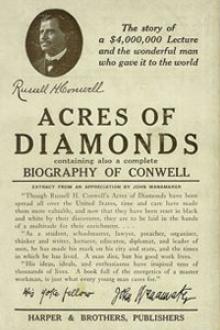Acres of Diamonds - Russell H. Conwell (big screen ebook reader .txt) 📗

- Author: Russell H. Conwell
- Performer: 1599869802
Book online «Acres of Diamonds - Russell H. Conwell (big screen ebook reader .txt) 📗». Author Russell H. Conwell
The second time he saw Lincoln was when he went to Washington to plead for the life of one of his men who had been condemned to death for sleeping on post. He was still but a captain (his promotion to a colonelcy was still to come), a youth, and was awed by going into the presence of the man he worshiped. And his voice trembles a little, even now, as he tells of how pleasantly Lincoln looked up from his desk, and how cheerfully he asked his business with him, and of how absorbedly Lincoln then listened to his tale, although, so it appeared, he already knew of the main outline.
“It will be all right,” said Lincoln, when Conwell finished. But Conwell was still frightened.
He feared that in the multiplicity of public matters this mere matter of the life of a mountain boy, a private soldier, might be forgotten till too late. “It is almost the time set—” he faltered.
And Conwell’s voice almost breaks, man of emotion that he is, as he tells of how Lincoln said, with stern gravity: “Go and telegraph that soldier’s mother that Abraham Lincoln never signed a warrant to shoot a boy under twenty, and never will.” That was the one and only time that he spoke with Lincoln, and it remains an indelible impression.
The third time he saw Lincoln was when, as officer of the day, he stood for hours beside the dead body of the President as it lay in state in Washington. In those hours, as he stood rigidly as the throng went shuffling sorrowfully through, an immense impression came to Colonel Conwell of the work and worth of the man who there lay dead, and that impression has never departed.
John Brown, Abraham Lincoln, old Revolutionary Lexington—how Conwell’s life is associated with famous men and places!—and it was actually at Lexington that he made the crucial decision as to the course of his life! And it seems to me that it was, although quite unconsciously, because of the very fact that it was Lexington that Conwell was influenced to decide and to act as he did. Had it been in some other kind of place, some merely ordinary place, some quite usual place, he might not have taken the important step. But it was Lexington, it was brave old Lexington, inspiring Lexington; and he was inspired by it, for the man who himself inspires nobly is always the one who is himself open to noble inspiration. Lexington inspired him.
“When I was a lawyer in Boston and almost thirty-seven years old,” he told me, thinking slowly back into the years, “I was consulted by a woman who asked my advice in regard to disposing of a little church in Lexington whose congregation had become unable to support it. I went out and looked at the place, and I told her how the property could be sold. But it seemed a pity to me that the little church should be given up. However, I advised a meeting of the church members, and I attended the meeting. I put the case to them—it was only a handful of men and women—and there was silence for a little. Then an old man rose and, in a quavering voice, said the matter was quite clear; that there evidently was nothing to do but to sell, and that he would agree with the others in the necessity; but as the church had been his church home from boyhood, so he quavered and quivered on, he begged that they would excuse him from actually taking part in disposing of it; and in a deep silence he went haltingly from the room.
“The men and the women looked at one another, still silent, sadly impressed, but not knowing what to do. And I said to them: `Why not start over again, and go on with the church, after all!’ ”
Typical Conwellism, that! First, the impulse to help those who need helping, then the inspiration and leadership.
“ `But the building is entirely too tumble-down to use,’ said one of the men, sadly; and I knew he was right, for I had examined it; but I said:
“ `Let us meet there to-morrow morning and get to work on that building ourselves and put it in shape for a service next Sunday.’
“It made them seem so pleased and encouraged, and so confident that a new possibility was opening that I never doubted that each one of those present, and many friends besides, would be at the building in the morning. I was there early with a hammer and ax and crowbar that I had secured, ready to go to work—but no one else showed up!”
He has a rueful appreciation of the humor of it, as he pictured the scene; and one knows also that, in that little town of Lexington, where Americans had so bravely faced the impossible, Russell Conwell also braced himself to face the impossible. A pettier man would instantly have given up the entire matter when those who were most interested failed to respond, but one of the strongest features in Conwell’s character is his ability to draw even doubters and weaklings into line, his ability to stir even those who have given up.
“I looked over that building,” he goes on, whimsically, “and I saw that repair really seemed out of the question. Nothing but a new church would do! So I took the ax that I had brought with me and began chopping the place down.
In a little while a man, not one of the church members, came along, and he watched me for a time and said, `What are you going to do there?’
“And I instantly replied, `Tear down this old building and build a new church here!’
“He looked at me. `But the people won’t do that,’ he said.
“ `Yes, they will,’ I said, cheerfully, keeping at my work. Whereupon he watched me a few minutes longer and said:
“ `Well, you can put me down for one hundred dollars for the new building. Come up to my livery-stable and get it this evening.’
“ `All right; I’ll surely be there,’ I replied.
“In a little while another man came along and stopped and looked, and he rather gibed at the idea of a new church, and when I told him of the livery-stable man contributing one hundred dollars, he said, `But you haven’t got the money yet!’
“ `No,’ I said; `but I am going to get it to-night.’
“ `You’ll never get it,’ he said. `He’s not that sort of a man. He’s not even a church man!’
“But I just went quietly on with the work, without answering, and after quite a while he left; but he called back, as he went off, `Well, if he does give you that hundred dollars, come to me and I’ll give you another hundred.’ ”
Conwell smiles in genial reminiscence and without any apparent sense that he is telling of a great personal triumph, and goes on:
“Those two men both paid the money, and of course the church people themselves, who at first had not quite understood that I could be in earnest, joined in and helped, with work and money, and as, while the new church was building, it was peculiarly important to get and keep the congregation together, and as they had ceased to have a minister of their own, I used to run out from Boston and preach for them, in a room we hired.
“And it was there in Lexington, in 1879, that I determined to become a minister. I had a good law practice, but I determined to give it up. For many years I had felt more or less of a call to the ministry, and here at length was the definite time to begin.
“Week by week I preached there”—how strange, now, to think of William Dean Howells and the colonel-preacher!—“and after a while the church was completed, and in that very church, there in Lexington, I was ordained a minister.”
A marvelous thing, all this, even without considering the marvelous heights that Conwell has since attained—a marvelous thing, an achievement of positive romance! That little church stood for American bravery and initiative and self-sacrifice and romanticism in a way that well befitted good old Lexington.
To leave a large and overflowing law practice and take up the ministry at a salary of six hundred dollars a year seemed to the relatives of Conwell’s wife the extreme of foolishness, and they did not hesitate so to express themselves. Naturally enough, they did not have Conwell’s vision. Yet he himself was fair enough to realize and to admit that there was a good deal of fairness in their objections; and so he said to the congregation that, although he was quite ready to come for the six hundred dollars a year, he expected them to double his salary as soon as he doubled the church membership. This seemed to them a good deal like a joke, but they answered in perfect earnestness that they would be quite willing to do the doubling as soon as he did the doubling, and in less than a year the salary was doubled accordingly.
I asked him if he had found it hard to give up the lucrative law for a poor ministry, and his reply gave a delightful impression of his capacity for humorous insight into human nature, for he said, with a genial twinkle:
“Oh yes, it was a wrench; but there is a sort of romance of self-sacrifice, you know. I rather suppose the old-time martyrs rather enjoyed themselves in being martyrs!”
Conwell did not stay very long in Lexington.
A struggling little church in Philadelphia heard of what he was doing, and so an old deacon went up to see and hear him, and an invitation was given; and as the Lexington church seemed to be prosperously on its feet, and the needs of the Philadelphia body keenly appealed to Conwell’s imagination, a change was made, and at a salary of eight hundred dollars a year he went, in 1882, to the little struggling Philadelphia congregation, and of that congregation he is still pastor—only, it ceased to be a struggling congregation a great many years ago! And long ago it began paying him more thousands every year than at first it gave him hundreds.
Dreamer as Conwell always is in connection with his immense practicality, and moved as he is by the spiritual influences of life, it is more than likely that not only did Philadelphia’s need appeal, but also the fact that Philadelphia, as a city, meant much to him, for, coming North, wounded from a battle-field of the Civil War, it was in Philadelphia that he was cared for until his health and strength were recovered. Thus it came that Philadelphia had early become dear to him.
And here is an excellent example of how dreaming great dreams may go hand-in-hand with winning superb results. For that little struggling congregation now owns and occupies a great new church building that seats more people than any other Protestant church in America—and Dr. Conwell fills it!
IIISTORY OF THE FIFTY-SEVEN CENTS
AT every point in Conwell’s life one sees that he wins through his wonderful personal influence on old and young. Every step forward, every triumph achieved, comes not alone from his own enthusiasm,





Comments (0)